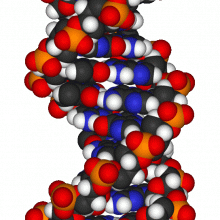In our quest for answers we discover how memories might be encoded in genes, though probably not the sort of memories you were expecting. Plus, we ask what would happen if you shine a light whilst travelling at light speed.
In this episode

00:00 - Are memories encoded in our genes?
Are memories encoded in our genes?
We posed this question to Professor Wolf Reik from the Babraham Institute in Cambridge...
Wolf - This depends what kind of memories we're talking about. We work on epigenetic memory which is really the memory in the genome, epigenetic markers in the genome, and that can be passed on from cell to cell, so that cells, when they divide, basically remember what they were before. This is going on all the time, this kind of epigenetic memory. All of the cells that we have in our body carry this kind of memory of their identity, of what they are, of what tissue they are, and this is really important because if that memory goes wrong for example, the outcome can be cancer.
And then, is it possible that the environment and things that we experience is laid down in memories in the brain? That's certainly the case. Is that through epigenetic mechanisms? Maybe.
Then to extend the question even further, is it possible that those memories that get laid down in the brain as part of an epigenetic mechanism could be inherited by our children and grandchildren? I think that's a big leap, kind of theoretically possible, but remember that brain cells are very specialised. The things that get laid down in the brain cells predominantly happens after birth.
Diana - So epigenetic memory can be inherited by cells and help them to become liver cells, heart cells, or even brain cells. But the things we experience through life create memories and they're recorded in or between our brain cells, and brain cells would've divided following the instructions from their epigenetic memory. But this epigenetic memory would've been written before your parents had collected any memories in the first place. Wolf - And at that point, the germ cells, the egg or the sperm which then transmit the genetic and epigenetic information to children and grandchildren are already formed, and are far away from the brain. And so, the short answer is that the things that happen to the brain, and may even involve epigenetic mechanisms to consolidate memory, in my view are not so likely to be passed on to our children and grandchildren.
Diana - Perhaps you can inherit epigenetic memory from your parents, but not memories from their very varied and interesting lives. There has been quite a bit of research on worm epigenetics. A team in Massachusetts in the USA found that worms which experience stress whilst developing would pass on different epigenetic information to its offspring than those which had been happy larvae. And some people think that humans who underwent stresses like malnutrition during development might pass their epigenetics onto future offspring too.









Comments
Add a comment